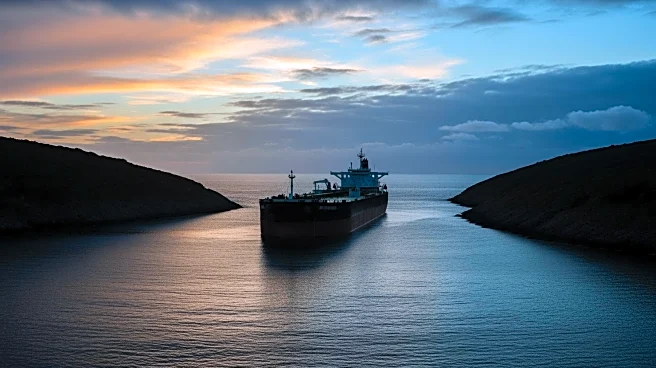What's Happening?
Iran has confirmed the seizure of a Marshall Islands-flagged oil tanker, identified as Talara, in the Strait of Hormuz. The Islamic Revolutionary Guard Corps (IRGC) claims the vessel was carrying an 'illegal
consignment' of petrochemical products, totaling 30,000 tonnes, en route to Singapore. The IRGC stated that the operation was conducted to protect Iran's national interests and resources, following a court order. The UK Maritime Trade Operations center noted possible 'state activity' that led to the tanker being forced into Iranian waters. The seizure occurs amid heightened regional tensions, particularly following a recent conflict with Israel and U.S. strikes on Iranian nuclear sites.
Why It's Important?
The Strait of Hormuz is a critical chokepoint for global oil trade, with about 20% of the world's oil passing through it. Iran's actions in seizing the tanker could exacerbate existing tensions with Western nations, particularly the U.S., which maintains a naval presence in the region to ensure maritime security. This incident may impact global oil markets and contribute to geopolitical instability, affecting international relations and economic conditions. The seizure highlights ongoing security challenges in the region and Iran's willingness to assert control over strategic waterways.
What's Next?
The situation may lead to increased diplomatic efforts to resolve tensions between Iran and Western countries. The U.S. Navy's 5th Fleet, based in Bahrain, is likely to continue its patrols to maintain security in the region. Further incidents could prompt international responses, including potential sanctions or negotiations aimed at de-escalating the situation. Stakeholders such as shipping companies and oil traders will closely monitor developments, as any disruption in the Strait of Hormuz could have significant economic repercussions.
Beyond the Headlines
The seizure of the tanker underscores the complex geopolitical dynamics in the Middle East, where maritime security is intertwined with broader issues such as nuclear proliferation and regional conflicts. Iran's actions may be seen as a strategic move to leverage its position in negotiations with Western powers. The incident also raises questions about the legal and ethical implications of seizing commercial vessels, potentially setting a precedent for future maritime disputes.










